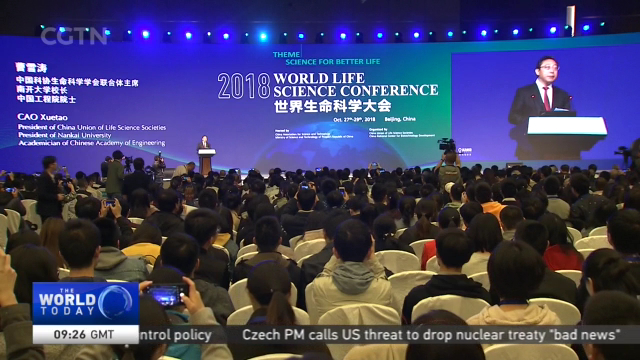
19:05, 29-Oct-2018
Cancer Treatment in China: Scientists discuss cancer issues at 2018 World Life Science Conference
Updated
18:16, 01-Nov-2018
03:04

Cancer is China's number one killer. Treatments like cell therapy, immune system therapy, and certain drugs continue to improve. But experts say China trails far behind other nations in tackling cancer. CGTN's Wang Mengzhen takes us to the 2018 World Life Science Conference in Beijing to find out more.
Cancer claims nearly three million lives a year in China.
Two scientists are sharing this year's Nobel Prize in Physiology or Medicine for their discoveries in activating the immune system to wipe out cancers. But experts say immunotherapy alone is not enough.
ZHAN QIMIN, BIOLOGIST & VICE PRESIDENT PEKING UNIVERSITY "Immune therapy is powerful especially for late stage of certain type of cancer. But at first level you still need to do a good job in earlier diagnoses for most if people could be found at earlier time, the 5-year-survival is high."
Doctors gauge most cancer treatments based on a five-year-survival rate.
Over the past decade, China's survival rate has climbed from about 30 to 40 percent. But it still lags behind developed countries.
Chinese scientists now pin great hope on cell therapy. A recent Goldman Sachs report says China is catching up with the US in gene editing for testing what's called the CAR-T and CRISPR studies.
DAVID BALTIMORE 1975 NOBEL LAUREATE IN PHYSIOLOGY AND MEDICINE "There are many labs in China focusing on gene editing. China is playing a central role."
But challenges remain.
This summer, the film "Dying to survive" hit a nerve with the Chinese public.
It tells the story of a Chinese man smuggling cheap drugs for leukemia patients from India because they couldn't afford patented drugs.
And It's based on a true story.
ZHAN QIMIN, BIOLOGIST & VICE PRESIDENT PEKING UNIVERSITY "More than 95% of initial patented clinical drugs are from abroad. Only less than 5% percent are made in China. That's why we need to increase innovation capabilities to develop drugs to reduce the medical costs."
And international collaboration plays a critical role here as well.
PROFESSOR YEUL HONG KIM KOREA UNIVERSITY COLLEGE OF MEDICINE "We have worked closely together with Chinese doctors by sharing data and experience. It is helpful because we have more experience in detecting cancer at the early stage while Chinese doctors do better in cancer treatment in advanced stage."
WANG MENGZHEN BEIJING "This is the second time China is hosting such a huge life-science gathering. And though this year's conference is now coming to an end, leading global scientists are certainly hopeful, that face-to-face exchanges like this will continue. WMZ, CGTN, Beijing."

SITEMAP
Copyright © 2018 CGTN. Beijing ICP prepared NO.16065310-3
Copyright © 2018 CGTN. Beijing ICP prepared NO.16065310-3